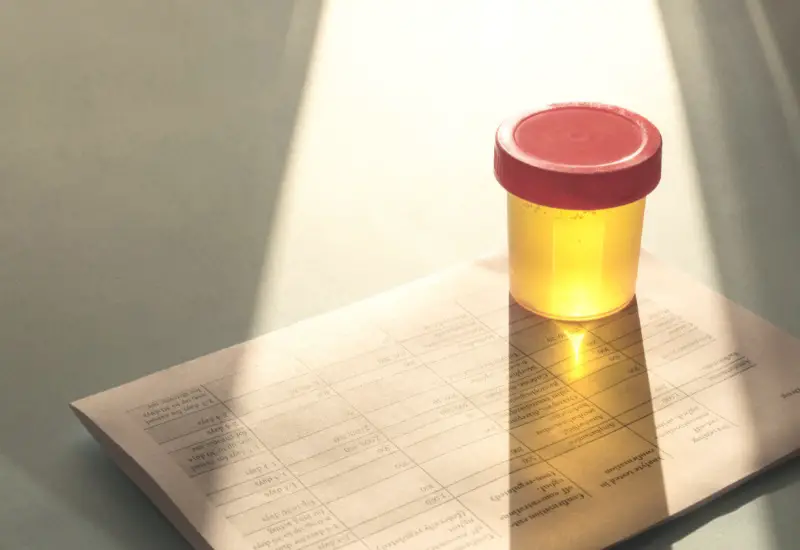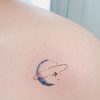Let me say this from the very start; it’s essential to understand that the only way to ensure a negative drug test is not to use drugs. Not at all.
Two of the most common ingredients in major air transport accidents are drugs and alcohol.
That’s why testing for these two things is so very important in our industry, and why aviation has developed such strict regulations designed to make sure that everyone involved is fit and able to carry out their duties to the full extent of their training.
These are needed to keep our skies safe.
Do flight attendants get drug tested?
Yes. All flight attendants in the aviation world have to pass a drug screening test before getting hired and to submit to ongoing tests when they are in the job.
In countries such as the USA, the Netherlands, and the UK, we also get randomly tested a few times per year without any advance warning.
What kind of drug test do flight attendants take?
Urine
It’s the most popular type of test for flight attendants and pilots because it’s simple and highly accurate.
THC (a component of marijuana), cocaine, opiates, PCP, and amphetamines can all be detected in a urine test.
Those who use drugs, be it recreationally or otherwise, often want to know how long does the substance of their choice stays in their body.
There is no easy or exact answer to that, it will vary according to things like the dose, the person’s age, weight, presence of other drugs, even their sex.
So there is no way to say, “I’ll be fine in a few hours, I’ll just let it work it’s way out of my system” no way at all.
The test is also affected by your body’s metabolism and how long and often you have been using the drug. In short, the longer you have been using drugs, the easier they are to detect in your system.
Let’s take a look at some of the research on this:
Of all drugs, Marijuana is the one that lasts the longest.
According to the Mayo Clinic, marijuana can be detected for :
- up to 3 days after a single-use
- up to 5 days after moderate use (or using the drug four times per week)
- up to 10 days after daily, heavy use
- up to 30 days after chronic, heavy use
So the urine test is efficient and highly accurate, but there are also other types of drug tests.
Hair
Hair testing has an advantage because it can detect drug use over longer periods of time (usually around 90 days).
This test is available for home use.
Sweat
In this test, a patch is placed on the upper arm, midriff, or lower back to collect sweat.
Contaminants from the environment can’t penetrate this barrier, so the patch can be worn during normal activities and duties.
Blood
Blood tests are the most accurate test of all, but they generally are not used as much as urine testing.
Saliva
A saliva test is a way to detect if someone has been using drugs within the past few days.
But it has a drawback in that it may be less reliable in detecting marijuana.
Is it possible to cheat a drug test?
Yes.
Is there a way to succeed in cheating a drug test?
No.
Some have tried drinking large amounts of water beforehand, or adding chemicals such as bleach or salt to the urine sample to mask or eliminate the presence of drugs, or using other home-remedies such as eating fiber or taking diuretics.
There is a lot of mythology about whether or not these tactics work, but what it is sure, is that if any adulterant is found, it will raise a red flag and lead to additional drug testing.
And you will be caught.
Can you have a false-positive result? Can some medications cause a false positive?
Yes, in some cases, a drug test may detect the presence of drugs, even though they weren’t actually taken.
It’s not common, but it does happen.
Drug testing is accurate, but like most things, a 100% rate is not always possible.
Given that most false-positives results may be attributed to medicines and foods.
Let’s take a look at some examples:
Ibuprofen: You could show positive to marijuana, barbiturates, or benzodiazepines
Cold remedies: as well as hay fever medications/ nasal decongestants and some diet pills, could show up as a positive for amphetamines.
Sleeping pills: these can show as an indication for barbiturate use.
Poppy seeds: Eating poppy seeds can show -up a barbiturate use (usually morphine), so maybe eating that bagel sprinkled with poppy seeds may not be a good idea just before your test.
Stats on the testing failure rates
They are a little dated, but they do give you some idea of how very low the incidence of false-positives are.
According to the US FAA (Federal Aviation Authority) / DOT (Department of Transportation) testing results (2011) Drugs:
- 0.095% positive rate for pilots (41,000 tested)
- 0.462% for all aviation employees tested (191,000 tested)
(FAA presentation, 13 May 2013).
The take out from all of that?
Be aware of what you are putting into your body and how it might affect any upcoming drug tests.
Random tests, obviously, are a little more problematic, but still, be aware that what you are putting in your mouth could have consequences for your career.
How often do flight attendants get drug tested?
Flight attendants in the US are subject to random drug testing, conducted by the Department of Transportation (DOT), with approximately 25% of all staff tested at least once each year.
When do flight attendants get drug tested?
- Pre-employment: As a new hire in a safety-sensitive position, you’ll get tested before starting your new job and if you fail this test you will be shown the door. No questions asked, no excuses accepted.
- Random drug testing: As the name suggests, this can happen at any time and without warning.
- Post-accident/post-incident drug testing: Regulations require this test is to be done no later than 32 hours after the accident on any employee whose performance contributed to an accident
- Reasonable-cause drug testing: If they suspect that an employee in a safety-sensitive function has used or is using a prohibited substance, they will be tested.
- Return to duty drug testing: This test is given to an employee after previously testing positive or refusing to submit to testing (and therefore removed from work) before being allowed back to work.
- Follow-up: This is for any employee who has previously tested positive. They will complete 6 unannounced tests within the following year after returning to their position and this testing may continue for up to 5 years after that.
What substances are to be tested?
The drug test you take to become a flight attendant will test for all recreational drugs including:
- Marijuana
- Opiates
- Phencyclidine (PCP)
- Cocaine
- Amphetamines
What if you fail the drug test?
If any of the above substances are found in your system before you are employed, you won’t be hired.
It’s that simple and that final.
If you take and fail a drug test during the hiring process, your offer of employment will be withdrawn and the process will halt immediately.
If you are currently working as a flight attendant and fail a random drug test, Federal regulations demand that you be immediately pulled from your job.
Airlines also have their own internal policies, which typically include you losing your job.
Employers are not required to give anyone that has failed a previous drug test the opportunity to work for them.
It’s just too risky. In fact, you may even be blacklisted by them and other airlines.
Refusing to take a drug test
If you are asked to take a drug test and refuse to do so, it’s treated in exactly the same way as a failed test.
And that’s because it’s assumed that you’re not willing to take the test because you know you’ll fail.
So if you walked outside the collection site to smoke a cigarette or to make a phone call, did you actually refuse?
Yes.
Failure to remain at the testing site until the testing process is completed is exactly the same as a refusal to test.
Don’t leave – for any reason – until the whole process is completed and your samples have been taken.
And something that you may not be aware of; if you can’t provide sufficient urine during a drug test, it’s treated as a refusal unless there is a verifiable medical reason for that lack of urine.
In the USA, what if marijuana is legal in my state?
If you tested positive for marijuana on a DOT/FAA drug test, but recreational use of marijuana is legal in your state, it’s important to be aware that the FAA’s regulation expressly prohibits you from performing a safety-sensitive function while having a prohibited drug, which includes marijuana, in your system.
To put it more simply, just because it’s legal, it doesn’t make it right.
Safety is everything in our industry, so you may not be stepping outside of the law by using marijuana pre-flight, but you will definitely be stepping outside of the FAA requirements.
Any positive result for marijuana (legal in your State or not) on a DOT/FAA test, will mean that you will be stripped of your FAA medical certificate.
And that means that you will no longer be able to work as a flight attendant.
Career over.
Do flight attendants get drug tested in Europe?
European flight attendants also get drug tested before being hired by any company and every time they sit their medical.
So every year thereafter, or every few years maybe 2-5, depending on your age:
And although random drug testing is not mandatory under the new EU rules, Member States can choose to do random tests.
National legislation regarding random drugs and alcohol testing varies largely across the EU, each country has a specific structure, legal scene, and approach.
In some Member States, random D&A testing is exclusively performed by the police, while in other Member States ‘purely’ random testing of employees by the employer is regulated by data protection and privacy rules and is often not allowed.
Do they drug test flight attendants in Australia?
Yes, in Australia all airlines drug test you during your initial medical.
Tests by CASA (Civil Aviation Safety Authority) are random oral fluid and breath tests.
Tests by the airline are done after a safety issue arises – if you make a mistake at work, they’ll test the whole crew.
They can also perform the test if they believe that you’re doing drugs.
Conclusion
Please take my advice and be smart. If you plan to work in aviation, don’t do drugs.
Remember that the primary goal of having a drug and alcohol testing policy is safety.
There is not only the risk in getting caught and ending your career, you can also affect the life or passengers, colleagues, and yourself.
How would you evacuate a plane or deal with a fire if you are high on drugs?
There really is no middle road when it comes to drug-taking and having a career in aviation, the two things simply don’t mix.
So the choice is yours – drugs or a wonderful career.
There is also the moral issue of the fact that you are responsible for many lives while at work and if you are operating below par because you have taken drugs and people die or get injured, then you will have to live with that.
My message to you is quite simply this: don’t do drugs if you want to have a safe, long and rewarding career as a flight attendant. Not a hard message to understand, is it?



